Interesting Statistics Regarding Constipation
- Constipation is common among all ages and populations in the world.
- About 16 out of 100 adults have symptoms of constipation.
- About 33 out of 100 adults ages 60 and older have symptoms of constipation.1
- Constipation is the most common gastrointestinal complaint, resulting in 2.5 million doctor visits annually.2
- Constipation costs our medical system $12.7 billion dollars per year.3
- In the United States alone, more than $800 million dollars is spent on laxatives each year.4

Definition of Constipation
Constipation is a condition in which a person has uncomfortable or infrequent bowel movements. Generally, a person is considered to be constipated when bowel movements result in passage of small amounts of hard, dry stool, usually fewer than three times a week. However, normal stool elimination may consist of having a bowel movement three times a day or three times a week; it depends on the person.5
Causes of Constipation
Hard, dry stools are the result of the colon absorbing too much water. Normally, as food moves through the colon (also known as the large intestine) the colon absorbs water while forming stool (waste products). Muscle contractions then push the stool toward the rectum, and, by the time the stool reaches the rectum, most of the water has been absorbed, making the stool solid.
When the colon's muscle contractions are slow or sluggish, the stool moves through the colon too slowly, resulting in too much water being absorbed. Some of the most common causes of constipation include the following:
- Medications (especially pain meds)
- Not drinking enough water
- Lack of exercise
- Not enough fiber in the diet
- Ignoring the urge to have a bowel movement
- Changes in lifestyle, such as travel, pregnancy
- Neurologic disease such as Parkinson’s
- Medical issues such as diabetes, thyroid disorders
- Aging in general due to being less active and also the body slowing down
- Stress / anxiety / depression
- Gut bacteria imbalance
- Lack of digestive enzymes
- Lack of electrolytes
- Problems with intestinal function – ex. slow motility
- Abuse of laxatives
Symptoms of Constipation
The following are the most common symptoms of constipation. However, everyone may experience symptoms differently. Symptoms may include:
- Difficult and painful bowel movements
- Bowel movements fewer than three times per week (although I would say you should be pooping at least once per day, more on this later)
- Feeling bloated or uncomfortable
- Pebbles or lumpy stool (like image below)6
- Feeling like you don’t have complete bowel movements (like something is always left behind)
- Feeling sluggish
- Abdominal pain
- Gas pains that can manifest in all parts of the abdomen – stomach, back, chest, shoulders, etc.
The symptoms of constipation may resemble other medical conditions or problems, which is why it’s always important to consult a doctor for a proper diagnosis.
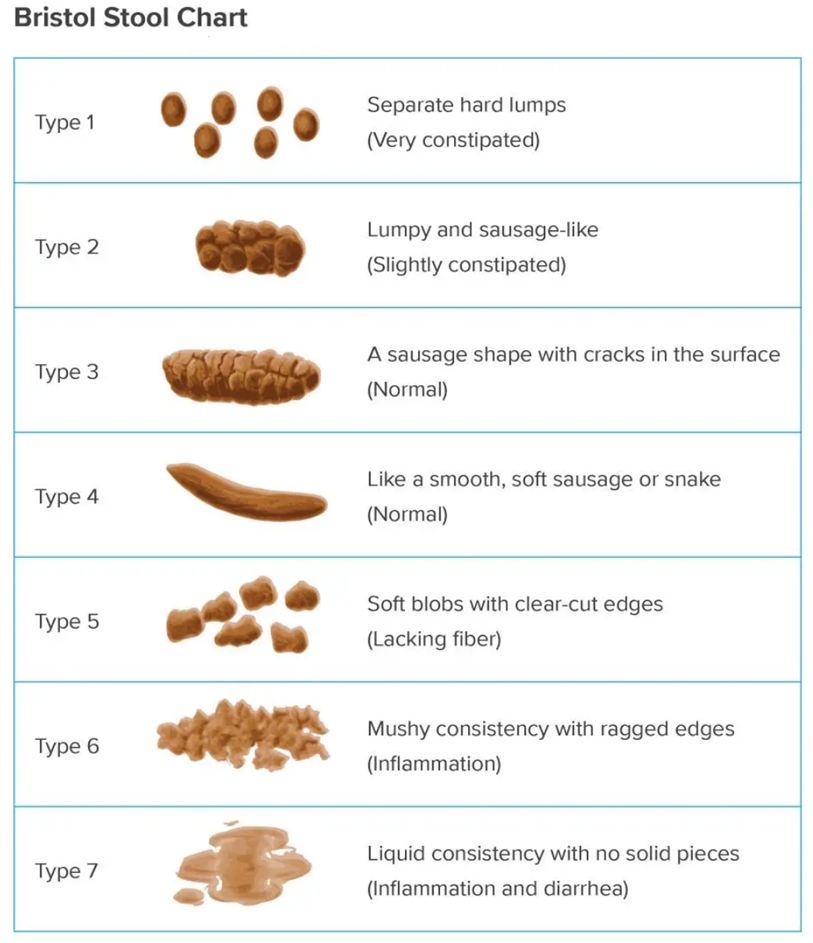
How Constipation is Diagnosed
The tests performed by a doctor will depend on the duration and severity of the constipation, since most people experience constipation at one time or another. The doctor will also consider the patient's age, and whether there is blood in the stool, recent changes in bowel habits, or weight loss.
Diagnosing constipation may include:
- Medical history. The doctor will ask for a description of the constipation, including duration of symptoms, frequency of bowel movements, and other information to help determine the cause of the constipation.
- Physical examination. A physical examination may also include a rectal exam, in which the doctor inserts a gloved, lubricated finger into the rectum to evaluate the tone of the muscle that closes off the anus. This examination also helps detect tenderness, obstruction, blood, amount, and caliber of stool, and if enlargement of the rectum is present.
Other diagnostic tests may include:
- Abdominal X-ray
- Lower GI (gastrointestinal) series(also called a barium enema). A lower GI series is a procedure that examines the rectum, the large intestine, and the lower part of the small intestine. A fluid called barium (a metallic, chemical, chalky, liquid used to coat the inside of organs so that they will show up on an X-ray) is given into the rectum as an enema. An X-ray of the abdomen shows strictures (narrowed areas), obstructions (blockages), and other problems.
-
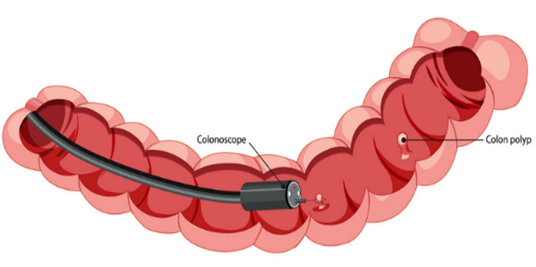 Colonoscopy.Colonoscopy is a procedure that allows the doctor to view the entire length of the large intestine, and can often help identify abnormal growths, inflamed tissue, ulcers, and bleeding. It involves inserting a colonoscope, a long, flexible, lighted tube, in through the rectum up through the entire colon. The colonoscope allows the doctor to see the lining of the colon, remove tissue for further examination, and possibly treat some problems that are discovered.
Colonoscopy.Colonoscopy is a procedure that allows the doctor to view the entire length of the large intestine, and can often help identify abnormal growths, inflamed tissue, ulcers, and bleeding. It involves inserting a colonoscope, a long, flexible, lighted tube, in through the rectum up through the entire colon. The colonoscope allows the doctor to see the lining of the colon, remove tissue for further examination, and possibly treat some problems that are discovered. - Sigmoidoscopy. A sigmoidoscopy is a diagnostic procedure that allows the doctor to examine the inside of a portion of the large intestine, and is helpful in identifying the causes of diarrhea, abdominal pain, constipation, abnormal growths, and bleeding. A short, flexible, lighted tube, called a sigmoidoscope, is inserted into the intestine through the rectum. This is a shorter exam than the colonoscopy and does not go through the entire colon. The scope blows air into the intestine to inflate it and make viewing the inside easier.
- Colorectal transit study. This test shows how well food moves through the colon. The patient swallows capsules containing small markers which are visible on X-ray. The patient follows a high-fiber diet during the test, and the movement of the markers through the colon is monitored with abdominal X-rays taken several times three to seven days after the capsule is swallowed.
- Anorectal function tests These tests diagnose constipation caused by an abnormal functioning of the anus or rectum.
Types of Constipation
There are three main types of constipation: normal-transit constipation, slow-transit constipation, and pelvic floor dysfunction constipation.
- Normal-transit constipation is the most common type of constipation seen in medical practice. Simply put, the stool passes through the colon at a normal rate, however despite this, the person still feels constipated. A person may have trouble in passing the stool, they may have to strain, may have urgency and still not be able to pass the stool. They may experience bloating, abdominal pain and/or discomfort, and the stools may be hard.
- Slow-transit constipation is caused by problems with the way stool moves through the intestine. This is typically characterized by reduced motility of the colon which can be due to problems with the muscles of the colon and/or the nerves that control bowel movements. This type of constipation is characterized by complex, dry stools that are difficult to pass, a feeling of fullness after eating and bloating.
- Pelvic floor dysfunction is when the muscles around the anus and rectum are too weak or too tight to allow regular bowel movements. This type of constipation is characterized by a feeling of obstruction in the rectum, pain during bowel movements, and incomplete evacuation.
Traditional Medical Treatment for Constipation
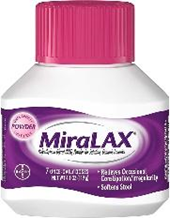 If a person goes to their primary care provider for constipation, they will typically be prescribed constipation medicine, most likely an over-the-counter laxative. Maybe they will be advised to increase their water intake, exercise and the fiber in their diet, but that’s pretty much all. They might be referred to a gastroenterologist for further evaluation. Even with a gastroenterologist, there really isn’t much more that will be done, possibly a colonoscopy or some form of imaging study. If the over-the-counter laxative is not working the gastroenterologist may prescribe a stronger medicine.
If a person goes to their primary care provider for constipation, they will typically be prescribed constipation medicine, most likely an over-the-counter laxative. Maybe they will be advised to increase their water intake, exercise and the fiber in their diet, but that’s pretty much all. They might be referred to a gastroenterologist for further evaluation. Even with a gastroenterologist, there really isn’t much more that will be done, possibly a colonoscopy or some form of imaging study. If the over-the-counter laxative is not working the gastroenterologist may prescribe a stronger medicine.
As a traditionally trained gastroenterologist this is what I did for years, but most of it was to no avail. My patients continued to come in hurting and in pain.
Complications of Constipation
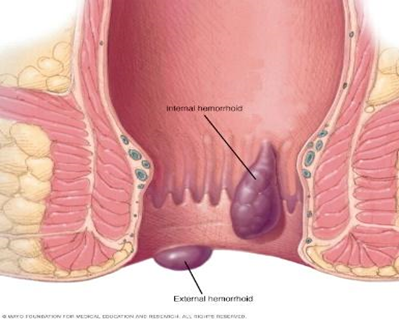 Constipation can cause complications, such as hemorrhoids, which occur by straining to have a bowel movement, or anal fissures (tears in the skin around the anus) which occur when hard stool stretches the sphincter muscle. This can result in rectal bleeding.7
Constipation can cause complications, such as hemorrhoids, which occur by straining to have a bowel movement, or anal fissures (tears in the skin around the anus) which occur when hard stool stretches the sphincter muscle. This can result in rectal bleeding.7
Sometimes, straining also causes rectal prolapse, where a small amount of intestinal lining pushes out from the anal opening. Constipation may also cause fecal impaction, which occurs mostly in children and older adults. The hard stool packs the intestine and rectum so tightly that the normal pushing action of the colon is not enough to expel the stool.
What Traditional Medicine is Not Telling You About Constipation
The information I am about to share with you was not taught to me during any of my medical training. What medical school, internship, internal medicine residency, and my Gastroenterology fellowship taught me was how to diagnose symptoms, prescribe medicines and do amazing colonoscopies and upper endoscopies. What it didn’t teach was the true reason why people are having symptoms to begin with. And the idea that three bowel movements per week is normal, is completely crazy.
There is a term you need to learn and that is, “food in – food out”. Your gastrointestinal system is a giant tube from start to finish. If something is going in, something should be coming out. Ideally if you are eating three meals per day, you should be having a bowel movement three times per day. But most people are not experiencing this. If you’re not having at least ONE bowel movement per day, you are probably constipated, and you don’t even realize it.
Maybe you’re having a bowel movement every other day, or every three days and that’s how it’s been since you were a kid, so you think it’s normal. But with that, you are frustrated because you feel full all the time, bloated, uncomfortable, experiencing abdominal pain or discomfort, feeling tired and low energy, possibly a little foggy in your thinking. That is because you are CONSTIPATED.
Why It’s Important to Poop Every Day
By the time food reaches the colon, what is left is considered toxic waste. This toxic waste is supposed to come out, not hang out in your colon. Some may think that if it’s sitting in the colon, it’s all good, it will eventually come, no hurry. BUT WAIT…the colon is not a lead pipe, it’s a live organ made of live tissue and cells. This toxic waste sitting in your colon can move through the walls and get into your bloodstream and make you sick. This means you DON’T want stool sitting there any longer than it needs to.
The best analogy I can give is your kitchen trash can. Every day you are filling it with trash. Notice how if the trash is left there for a few days it putrefies and it starts to stink up the kitchen. The same thing is happening in your colon. The bottom line is pooping is ESSENTIAL to detoxifying our body and being healthy. If you do not have at least one daily bowel movement, you are doing a disservice to your body.
Long-Term Effects of Over-the-Counter Meds
Many of our patients who are suffering from constipation have been on over-the-counter laxatives for years. They share with me that the only way they can have a bowel movement is to just take the medicine every day and they’ve been doing that for decades and it works fine. Unfortunately, this is not FINE.
The other issue that arises with frequent usage of laxatives or strong prescription medicines for constipation is that they can cause diarrhea. Now the patient is on the cycle of constipation med and then diarrhea med, week after week, month after month. This can be very taxing on the body.
Over-the-counter medicines are not fixing the issue, they are a band-aid for it. And in the end, they are truly doing your body a disservice. Many laxatives basically train your colon how not to be colon. Your colon is a muscle, its job is to squeeze and when you take laxatives regularly, you are basically giving your colon permission to not work. The medicine is telling your colon, “It’s okay colon, you don’t have to do your job, I will do it for you.” Now that colon that was not functioning properly to begin with, completely forgets how to do its job. If you truly want to be healthy, you must stop putting a band aid on the problem and start fixing it.
LA Different Approach to Constipation
In 2007, I approached my wife and Office Manager Tina and told her how frustrated I was with medicine. I was running all the tests, doing all the procedures, and prescribing all the medicines and could not figure out why my patients were still hurting. That frustration led us on a two-year journey to learn what my medical degree did not teach me about the body and how it works, in addition to what is happening in the medical industry, pharmaceutical industry and food industry to cause so many health problems in our society.
After we learned what we did, we felt obligated to share this with our patients and we’ve been doing so since 2010. Tina was so passionate about what we learned, she went back to school and received her Certificate in Holistic Nutrition so she could help me deliver this message to as many people as we possibly could. Since we started on this journey, we have helped tens of thousands of patients and wellness clients eliminate their symptoms naturally, helping their bodies work again like they were meant to work. And the best part of it all, is it’s not as hard as you may think to turn it all around, no matter how long you’ve been suffering or how old you are. If you are willing to put in the time, effort and invest in yourself, you can have your life back too.
For constipation it’s as simple as incorporating the following:
 A Microbiome Stool Test GI disruptors and bacteria imbalance are the number one cause of constipation. If your gut is overrun by bad bacteria, viruses, and pathogens, it’s difficult for the body to be well. This simple stool test will assess the status of pathogens, viruses, parasites, and bacteria that may be contributing to acute and / or chronic digestive and medical symptoms.
A Microbiome Stool Test GI disruptors and bacteria imbalance are the number one cause of constipation. If your gut is overrun by bad bacteria, viruses, and pathogens, it’s difficult for the body to be well. This simple stool test will assess the status of pathogens, viruses, parasites, and bacteria that may be contributing to acute and / or chronic digestive and medical symptoms.
- Many gastroenterologists order stool studies but they go through traditional labs such as Sonora or Lab Corp. This test is more comprehensive going deeper into the body and returning many more results.
- With this testing we will have a clear picture of the GI Disruptors affecting your health, allowing us to replenish your gut with healthy bacteria to not only get your body working properly but eliminate symptoms and pain.
- Digestive Enzymes Digestive enzymes help break down our food into smaller, more absorbable units. Your body cannot absorb the food you eat as is, it can only absorb nutrients. Therefore, for your body to benefit from what you eat, proteins need to be broken down into amino acids; fats need to be broken down into fatty acids and cholesterol; and carbohydrates need to be broken down into simple sugars. You rely on digestive enzymes to break down what you eat.
- If you are enzyme deficient, you are not absorbing nutrients from your food, even if the food you are eating is very healthy.
 In addition to not being able to absorb nutrients from what you are eating, enzyme deficiency can also cause many digestive symptoms such as acid reflux, heartburn, indigestion, nausea and vomiting, constipation, and diarrhea.
In addition to not being able to absorb nutrients from what you are eating, enzyme deficiency can also cause many digestive symptoms such as acid reflux, heartburn, indigestion, nausea and vomiting, constipation, and diarrhea. - At birth we are given a certain potential for manufacturing enzymes in our body, creating an enzyme “reserve.” However, if we do not continually replenish that reserve through proper nutrition, it runs out. With every decade of life our enzyme production depletes by 13%.
- Our Digestive Enzymes are called Everyday Enzymes™. They are what I like to call medical grade enzymes (high potency and no fillers). This is important when taking a supplement, especially a Digestive Enzyme. It is meant to be taken with meals to help you digest your food better. Remember, your GI tract is one long hallow tube from start to finish. If it doesn’t go well in the stomach, it’s probably not going to go well coming out the other end. Digesting your food well is the first step in having good, regular bowel movements.
- Probiotics Your digestive system is home to trillions of microorganisms, creating an ecosystem called the “gut flora.” Probiotics are good bacteria, which are needed to create a balance throughout the body. The body has both good and bad bacteria. Without a healthy balance of good bacteria, symptoms may occur such as diarrhea, constipation, gas, and bloating
- On a daily basis, we unconsciously consume various microbes that could potentially cause sickness. In a body that has plenty of “good bacteria,” these microbes will pass with no negative effects.
 However, if bad microbes are ingested in a body with an imbalanced gut flora, these microbes will cause sickness. The “bad bacteria” that are constantly in our system, are kept under control by the “good bacteria.”
However, if bad microbes are ingested in a body with an imbalanced gut flora, these microbes will cause sickness. The “bad bacteria” that are constantly in our system, are kept under control by the “good bacteria.” - Our Probiotics are called Pleasant Probiotics™. These are also medical grade (high potency and no fillers). It contains six strains of bacteria and a lot of each strain; this can’t be said for most probiotics on the market. Our product also has a prebiotic which is food for bacteria. Probiotics are meant to be taken on an empty stomach. We dose ours one in the morning and one at night. Taking a healthy probiotic daily is one of the simplest things you can do, not only for your digestive health but your overall health.
- More than half of our immune system is in the gut wall, so it is vital to keep that part of our body healthy. Many illnesses can be linked back to abnormal gut flora.
 Alkaline Water The “alkaline” in alkaline water refers to its pH level. A pH level is a number that measures how acidic or alkaline a substance is on an approximate scale of 0 to 14. For example, something with a pH of 1 would be very acidic, and something with a pH of 13 would be very alkaline. Regular drinking water generally has a neutral pH of 7. Alkaline water typically has a pH of 8 or 9. Alkaline water absorbs better into the body aiding in issues people have with dehydration (one of the number one causes of constipation). In addition to drinking more water when constipated, drinking alkaline water can also help the cause.
Alkaline Water The “alkaline” in alkaline water refers to its pH level. A pH level is a number that measures how acidic or alkaline a substance is on an approximate scale of 0 to 14. For example, something with a pH of 1 would be very acidic, and something with a pH of 13 would be very alkaline. Regular drinking water generally has a neutral pH of 7. Alkaline water typically has a pH of 8 or 9. Alkaline water absorbs better into the body aiding in issues people have with dehydration (one of the number one causes of constipation). In addition to drinking more water when constipated, drinking alkaline water can also help the cause.
- Just like a fish tank or a swimming pool, our body needs to maintain a certain pH to stay healthy. If we get really sick, our pH is monitored because if it drops below a certain amount we can die. When we are healthy, we don’t pay much attention to our pH, but that doesn’t mean it’s not important. On the pH scale, our body is slightly alkaline, so anything you can do to drink and eat more alkaline makes it easier for your body to maintain its alkalinity and in turn work to keep you healthy.
- Your body is a healing vessel, it wants you to be well. Sometimes we just need to help it out a little. Drinking alkaline water is one simple thing you can do to help your body out. It’s especially helpful for people suffering from constipation because it absorbs better in the body.
- Electrolytes Electrolytes are salts that are responsible for keeping the body properly hydrated so the muscles and nerves can function properly. The human body is composed mostly of salt water. Have you ever tasted your sweat or your tears? They are salty! Your body is a giant saltwater bag and all day long you are losing salt water, when you urinate, when you sweat or when you talk. If you do not replace this salt water your body becomes very dehydrated (again, a key symptom of constipation).
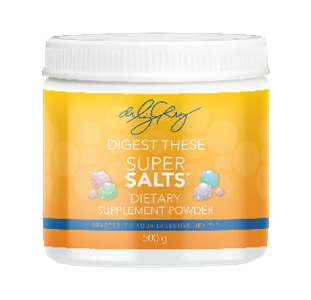 Our Electrolytes are called Super Salts™. They contain the four key electrolyte salts that are made up in the body allowing the body to replenish exactly what it is losing on a daily basis. Super Salts™ are meant to be put in water, not on food.
Our Electrolytes are called Super Salts™. They contain the four key electrolyte salts that are made up in the body allowing the body to replenish exactly what it is losing on a daily basis. Super Salts™ are meant to be put in water, not on food. - Our Super Salts™ are different from other electrolyte powders or water additives on the market because they have zero preservatives, sugars or artificial sugars. This is important because many of those additives can cause digestive issues in the body. When you take a supplement like this, the goal is to get well, not cause more issues – the cleaner the product you are consuming, the better.
- We suggest putting one scoop of salts (1 teaspoon) in every 26 – 32-ounce bottle of water you drink. If you cannot do this because it is too salty tasting, start by adding ¼ scoop of salts to 26 – 32 ounces of water and then increase from there once you get used to it.
- If you are constipated, the salts make a great mini-colonic formula. Add a whole scoop of salts to 3 ounces of water and shoot it – follow that with drinking 26 ounces of water within a 10 – 15-minute time period. We use the daily salt shot regimen to help patients get off over-the-counter laxatives and to teach the colon how to be a colon again.
- Think of the daily salt shot as the equivalent of taking your colon to the gym to rebuild the colon muscle.
Act Now – 3 Options to “Move” in the Right Direction
Depending on your level of commitment and interest in turning around your constipation issues, there are three options to consider:
- Good if you want to start slow and are not sure if this is for you, at least order our Everyday Enzymes™, Pleasant Probiotics™, and , Super Salts™. The investment is minimal and it’s not hard to incorporate these three supplements into your daily routine to see if they can help. I do encourage you to try this regimen for at least 3 months before you decide it’s not working for you. Doing something for only a few days or even a month is not going to make a huge difference in your body, especially if you’ve been constipated for a long time.

- Better if you are ready to make a more serious commitment to turning around your constipation and have some money to invest in yourself, consider ordering our Constipation Starter Kit. It includes a three-month supply of our Everyday Enzymes™, Pleasant Probiotics™, and Super Salts™ along with an Alkaline Water Pitcher so you can start benefiting from alkaline water right away. In addition, it also comes with the Microbiome Stool Test I explained above. This test will give us a clear picture as to what disruptors are causing the problems in your colon so you can stop guessing and get some answers. By purchasing the kit, you get all these items at a discounted rate so it’s much better than buying them individually.
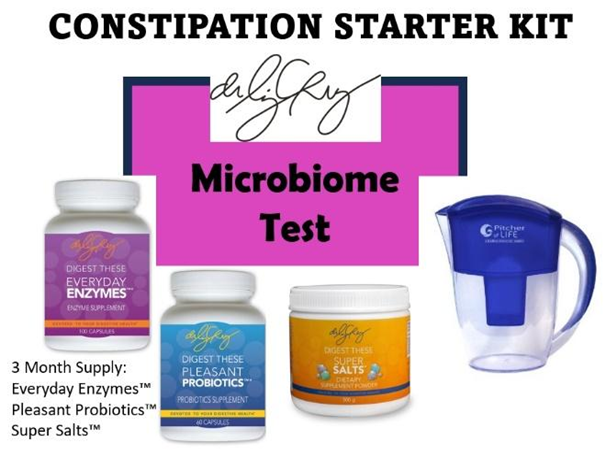
- Best if you have money to invest in yourself, are suffering from other medical issues aside from just constipation and you’re sick and tired of feeling sick and tired consider going all in on our Digestive Revolution™ Ultimate Plan. This is my 4-Step Proprietary System which is an outcomes and scientific based system that starts at the cellular level. The system delivers 4 main outcomes:
- Eliminates digestive issues such as gas, bloating, constipation, diarrhea, and acid reflux.
- Removes pain and inflammation from the body.
- Reduces the need for prescription and over-the-counter medications.
- Increases energy, enhances sleep, and the ability to get to your healthy base weight.

No matter what you decide to do, do something! You get sick and remain sick by accident – you get healthy on purpose!
References
[1] NIH - https://www.niddk.nih.gov/health-information/digestive-diseases/constipation/definition-facts
[2] Johns Hopkins medicine website - https://www.hopkinsmedicine.org/health/conditions-and-diseases/constipation
[3] BMC Public Health - https://bmcpublichealth.biomedcentral.com/articles/10.1186/1471-2458-14-374
[4] National Library of Medicine - https://pubmed.ncbi.nlm.nih.gov/12739323/
[5] John’s Hopkins Medicine - https://www.hopkinsmedicine.org/health/conditions-and-diseases/constipation
[6] Medical News Today - https://www.medicalnewstoday.com/articles/bristol-stool-scale
[7] Cleveland Clinic - https://my.clevelandclinic.org/health/diseases/13177-anal-fissures
These statements have not been evaluated by the Food and Drug Administration.
These products are not intended to diagnose, treat, cure, or prevent any disease.

Liz Cruz, MD
- Award-winning, board-certified gastroenterologist
- Sought-after leader in solving complex digestive health conditions
- 30+ years of dedicated patient service
- Best-selling author, podcaster and international speaker
Dr. Liz Cruz was named Top Gastroenterologist in 2019. She is a Diplomat of the American Board of Internal Medicine and the American Board of Gastroenterology. Dr. Cruz is a member of the American Gastroenterological Association, American College of Gastroenterology, and the American Society for Gastrointestinal Endoscopy. In 2014, she received the Quilly Award from the National Academy of Best-Selling Authors® for her Best-Selling Book “Answering the Call".
